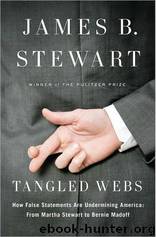Tangled Webs: How False Statements Are Undermining America: From Martha Stewart to Bernie Madoff by James B. Stewart

Author:James B. Stewart [Stewart, James B.]
Language: eng
Format: epub
Tags: Non-Fiction, Politics, Business, History
ISBN: 9781101476512
Goodreads: 10876716
Publisher: Penguin Group (USA)
Published: 2011-04-19T05:00:00+00:00
After a fifth appearance by Rove before the grand jury, Fitzgerald finally resolved the case against Rove. Fitzgerald sent Rove a letter on June 13 informing him no charges would be brought. Rove’s lawyer, Luskin, issued a statement saying he hoped the resolution would end “baseless speculation” about Rove. Out of deference to the ongoing investigation, he said Rove would have no further comment.
Rove felt neither elation nor relief. “I was still in shock,” he later said. Neighbors brought him a cake with the word “Congratulations” on top in blue icing. But soon after, with his name now cleared, he began thinking about leaving the White House. Perhaps it was time.
Fitzgerald informed Novak’s lawyers that he was now free to discuss his role in the case. In fact, Novak had always been free to discuss it; nothing in grand jury secrecy rules prevents a witness from discussing his testimony. Miller and Cooper promptly disclosed their appearances, ignoring any request from Fitzgerald not to do so. But Novak’s lawyer was probably shrewd to advise him to remain silent while the firestorm raged over whether journalists were bound to protect their confidential sources, since he had revealed his and testified before the grand jury long before the courts ruled against Miller, Cooper, and Russert. Given the vindictive mood in the press, Novak would likely have been eviscerated.
Novak described his decision to testify in a July 12 column: “When I testified before the grand jury, I was permitted to read a statement that I had written expressing my discomfort at disclosing confidential conversations with news sources. It should be remembered that the special prosecutor knew their identities and did not learn them from me.” He named Rove in the column, but not his primary source because “he has not come forward to identify himself.”
His identity was revealed in Newsweek in late August. In “The Man Who Said Too Much” Michael Isikoff solved the mystery, drawing on an account in Hubris, a book he cowrote with David Corn of the Nation. “ ‘I’m afraid I may be the guy that caused this whole thing,’ [Armitage] later told Carl Ford Jr., State’s intelligence chief,” Isikoff wrote. “Ford says Armitage admitted to him that he had ‘slipped up’ and told Novak more than he should have. ‘He was basically beside himself that he was the guy that f–ed up. My sense from Rich is that it was just chitchat,’ Ford recalls.”
Armitage himself finally came forward and acknowledged his role in an interview with the Washington Post’s R. Jeffrey Smith that ran on September 8. He said he’d received permission from Fitzgerald to discuss his involvement and stressed that he’d never known Plame was a covert agent and had never before seen a covert agent’s name mentioned, even in a classified document. The article concluded: “Armitage said he deeply regrets embarrassing Powell, the State Department, his friends and family, and the Wilsons.” He said nothing about embarrassing or causing trouble for the CIA, the White House, Rove, or Libby.
Download
This site does not store any files on its server. We only index and link to content provided by other sites. Please contact the content providers to delete copyright contents if any and email us, we'll remove relevant links or contents immediately.
| Africa | Americas |
| Arctic & Antarctica | Asia |
| Australia & Oceania | Europe |
| Middle East | Russia |
| United States | World |
| Ancient Civilizations | Military |
| Historical Study & Educational Resources |
Cat's cradle by Kurt Vonnegut(13851)
Pimp by Iceberg Slim(12920)
Underground: A Human History of the Worlds Beneath Our Feet by Will Hunt(11247)
4 3 2 1: A Novel by Paul Auster(11027)
The Radium Girls by Kate Moore(10900)
American History Stories, Volume III (Yesterday's Classics) by Pratt Mara L(4819)
Perfect Rhythm by Jae(4616)
Wiseguy by Nicholas Pileggi(4577)
The Fire Next Time by James Baldwin(4336)
Paper Towns by Green John(4162)
A Higher Loyalty: Truth, Lies, and Leadership by James Comey(4024)
Pale Blue Dot by Carl Sagan(3993)
The Mayflower and the Pilgrims' New World by Nathaniel Philbrick(3905)
The Doomsday Machine by Daniel Ellsberg(3725)
Too Much and Not the Mood by Durga Chew-Bose(3689)
Killers of the Flower Moon: The Osage Murders and the Birth of the FBI by David Grann(3602)
The Borden Murders by Sarah Miller(3580)
The Sympathizer by Viet Thanh Nguyen(3451)
Killing England by Bill O'Reilly(3447)
